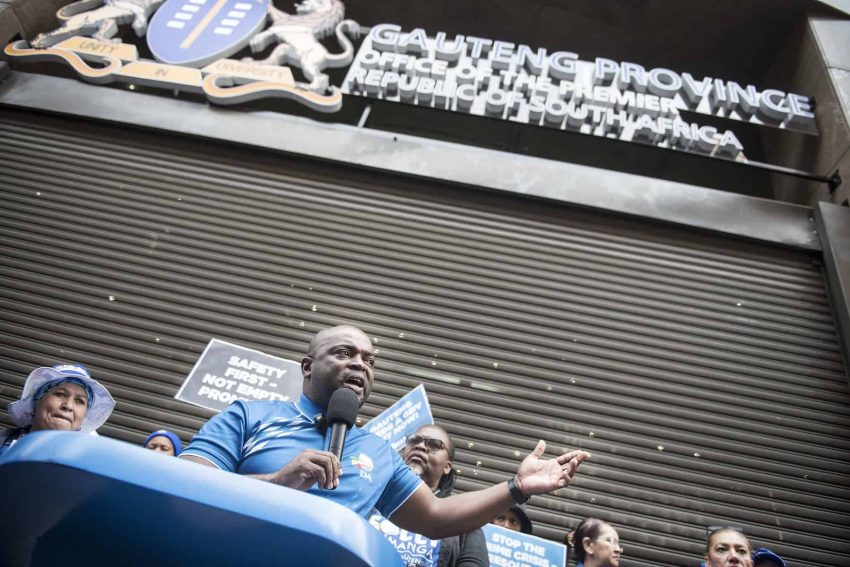The DA wants Premier Panyaza Lesufi to devolve national policing powers to the provincial level to address crime.
The Democratic Alliance (DA) in Gauteng is laying the blame for the province’s crime problem at the door of Premier Panyaza Lesufi.
The party took its anti-crime campaign to the steps of the premier’s offices in Johannesburg on Wednesday, where it picketed against perceived inaction.
Police under resourced
DA Gauteng members have been scrutinising the province’s law enforcement efforts, which they have been documenting throughout 2025.
Police resourcing and infrastructure have been front and centre as the DA sought to identify the holes in Gauteng’s crime-fighting capabilities.
WATCH: DA protests outside Lesufi’s office
So far this year, the party has found that almost 13% of police vehicles are beyond repair, while some police stations have less than half of their vehicle fleet in operation.
Vehicles that do work are ageing and suffer regular breakdowns, and when suspects are arrested, several police stations lack holding cells.
Police detectives are overwhelmed with cases, and over 100 of the province’s 140 community policing forums have gone without funding since 2022.
Police officers have shared how they are trying their best, with the DA believing officers are being let down by national and provincial structures.
“While Saps [South African Police Service] resourcing falls under the national government, Lesufi’s failure lies in his inability to effectively use his provincial platform to hold them accountable and ensure proper oversight,” the party stated on Wednesday.
“[Lesufi] must push for the devolution of policing powers, empowering competent provinces to make meaningful decisions at the provincial and local levels where the impact is most needed,” it added.
Lesufi’s interventions
The premier had implemented several measures in recent months in an attempt to address crime in Gauteng.
Lesufi in April led the signing of a memorandum of understanding that would streamline operations between national and municipal law enforcement bodies across the province.
ALSO READ: Crime in Johannesburg: The reality of doing business in the CBD
He has promised more CCTV cameras that help address gender-based violence and femicide, as well as community violence.
“We are declaring our intent to liberate communities that have become havens for criminals. Resources will be consolidated and deployed to affected areas, including Soshanguve and Olievenhoutbosch,” Lesufi said in April.
The DA attacked the crime warden programme but in May, Lesufi promised crime wardens additional training after complaints that they were ineffective in the field.
“We are here to support you. We will provide the necessary training and support and work with the South African Police Service to clarify your role,” he stated.
‘Catch the criminals’
The DA remained unsatisfied, saying they wanted to increased staffing for police, higher visibility, greater community engagement and improved attitudes and professionalism from officers.
In addition to a call for improved infrastructure and resources, the DA said it would push for greater accountability and anti-corruption measures.
Vowing to continue the fight in municipal councils and the legislature, DA Gauteng spokesperson for community safety Michael Sun reminded the public not to lay the blame on officers.
“When we go home from here, I want you to remember that not all police officers are bad. They are working under very difficult conditions, which we have seen with own eyes.
“We need to give them enough resources so that they can go out there and catch the criminals who are affecting all of us,” said Sun.
NOW READ: Trust in police falls: More than 60% of theft and robbery victims don’t report crimes
